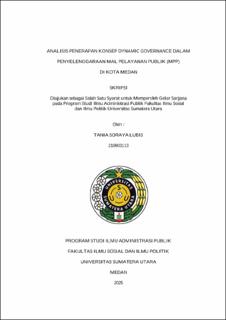| dc.description.abstract | This study aims to analyze the implementation of the Dynamic Governance concept in the administration of the Public Service Mall (Mal Pelayanan Publik/MPP) in Medan City. The concept emphasizes the importance of adaptive, reflective, and collaborative thinking through three main elements: thinking ahead, thinking again, and thinking across. This research uses a descriptive qualitative approach with data collection techniques including in-depth interviews, observations, and documentation.
The Medan City Investment and One-Stop Integrated Services Agency (DPMPTSP), as the managing institution of MPP, has applied the principle of thinking ahead through the digitalization of services, such as the implementation of an electronic queueing system and online licensing services, as a response to the evolving needs of the public. The thinking again principle is reflected in regular evaluations conducted internally and across agencies, such as quarterly coordination meetings and user satisfaction surveys, which are then used as the basis for service improvement. Meanwhile, the thinking across principle is evident through collaboration between DPMPTSP and various institutions providing services within the MPP, including both regional and central government agencies operating locally, as well as the involvement of non-government stakeholders such as private sector actors in supporting public service facilities.
The implementation of dynamic governance at the Medan City MPP shows positive progress, although challenges remain, such as limited time for staff training, varying levels of technological adaptability, and inconsistencies in standard operating procedures across institutions. This study concludes that the concept of dynamic governance has begun to be implemented, but further strengthening is needed to ensure that the governance of MPP can run more adaptively, efficiently, and sustainably. | en_US |


